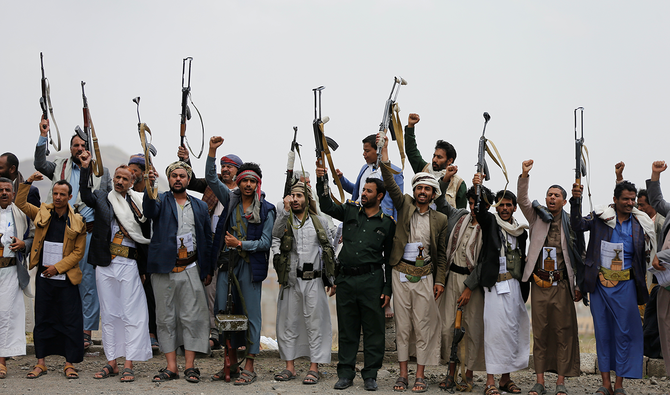AL-MUKALLA: A Yemeni military court in the government-controlled city of Marib held the initial session of the trial of Iran-backed Houthi leaders on Tuesday, accused of masterminding the coup against the internationally recognized government of President Abdrabbuh Mansur Hadi in 2015 and the subsequent military campaign.
The defendants faced charges of forming a terrorist armed group called Ansar Allah, colluding with the Lebanese group Hezbollah and Iran’s Islamic Revolutionary Guard Corps (IRGC), revolting against the republican system, putting Masur Hadi under house arrest and trying to kill him.
Along with the movement’s leader, Abdul Malik Al-Houthi, among the 175 accused figures were Mohammed Al-Houthi, a member of the country’s Supreme Political Council, Abdullah Yahiya Al-Hakim, a senior military commander, the Houthi ambassador to Iran, Ibrahim Mohammed Al-Daylami, and dozens of ministers, intelligence, military and political officials.
According to the official Saba news agency, the prosecution demanded the maximum available punishments for the defendants, including the death penalty.
By the end of the session, the court decided to publish the names of the accused figures in local newspapers and demanded that they appear the same court on Sept. 25, or face prosecution in absentia.
With the help of former President Ali Abdullah Saleh, Houthi militias seized control of the capital Sana’a in September 2014, and placed Mansur Hadi under house arrest, dismissing his government and replacing it with their allied Revolutionary Committees. The Houthis killed Saleh in late 2017 after leading a brief military uprising in Sana’a.
Dismantled Houthi cell
Also in Marib, Yemen’s defense and interior ministries said on Tuesday that the Houthi cell that was dismantled in Marib’s Wadi Abeda area late last month was responsible for masterminding many attacks against government, military and security targets in Marib.
In a joint statement, the two ministries said the cell, led by Mohsen Saleh Subayan, planned and carried out attacks against local security forces and Saudi-led coalition troops in Marib, planted landmines and improvised explosive devices, assassinated military and security officers and smuggled weapons. The statement noted that Subayan, along with several of his associates, were killed when they resisted security forces that came to capture them, and that drones, weapons and munitions were found in the area.
Local security and military officers believe that Houthi sleeper cells were involved in directing drone and missile strikes that targeted military camps in Marib since late 2015. The deadliest Houthi attack was in January 2020, when a drone and missiles fired by the Houthis landed at a camp, killing more than 110 soldiers, triggering heavy clashes between government forces and the Houthis, which disrupted diplomatic efforts to reach a peace deal led by the UN Yemen envoy Martin Griffiths.
Official media reported on Tuesday that Prime Minister Maeen Abdul Malik Saeed called the governor of Marib, Sultan Al-Arada, to congratulate him on dismantling the cell and foiling plots to undermine security and stability. Marib has hosted thousands of Yemeni army troops and coalition forces since the beginning of the Saudi-led military operation in Yemen in March 2015.


























